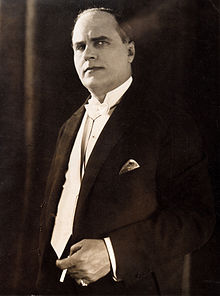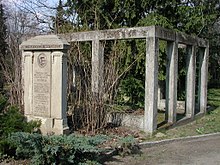Eduard von Winterstein
Eduard von Winterstein (born August 1, 1871 in Vienna , † July 22, 1961 in Berlin , actually: Eduard Clemens Franz Freiherr von Wangenheim ) was a German film and theater actor .
Life
His parents were the landowner Hugo von Wangenheim (born September 21, 1834 - December 19, 1924) and his second wife, the Hungarian actress Aloysia (Luise) Dub (1832–1904, later: von Wangenheim-Dub). After taking acting lessons from his mother, Winterstein came to the stage in Gera in 1889, where, according to his childhood memories published in 1942, he was able to experience an "undeservedly forgotten" actor, Theodor Lobe . At the opening of the theater in Annaberg on April 2, 1893, he played the title role there in Egmont. “I was born again in Annaberg, had become a completely different person. It was in this little town that I really became an actor. […] This is how the Annaberg period became one of the most beautiful in my profession, ”he wrote in his autobiography. At this theater he also met the actress Minna Mengers, whom he married in 1894 at the Wartburg (son: the actor Gustav von Wangenheim , 1895–1975). The theater in Annaberg-Buchholz today bears the name Eduard-von-Winterstein-Theater .
From 1895 he played at the Schiller Theater , later at the Deutsches Theater in Berlin. When he moved, Winterstein was enthusiastic about his adopted home with the following words:
"Berlin! At that time it was much more than the eagerly awaited paradise that every German actor strived for with all his might. [...] Here in the megacity, a lively theater life flourished. The theater almanac of 1895 names twenty-four theaters for Berlin. […] I and my family had temporarily found accommodation with relatives on Großbeerenstrasse. [...] I was happy that I was to make my debut in Berlin in this role (as Tellheim in Minna von Barnhelm ). "
From 1913, Winterstein also took on film roles in which the burly actor soon became the ideal cast for energetic people of respect such as generals, judges, squires and directors. Unlike in the theater, Winterstein's appearances in films were mostly limited to a few scenes. He appeared in over 160 films and discussed various intercom panels, including even in old age the ring story of Nathan the Wise for the GDR - record label Eterna .
In the time of National Socialism , at the end of the war, he was placed on the God-gifted list by the Reich Ministry for Public Enlightenment and Propaganda . In the period after the Second World War , Winterstein was part of the ensemble of the German Theater. There he played the role of Nathan nearly four hundred times.
Winterstein made a conscious decision to live in the GDR, a fact that GDR cultural policy took advantage of. After his death, the New Germany dedicated a special page to him, on which a text by Winterstein with the title “Choice of the better” was printed. The final passage reads:
“I experienced a lot of changes: under three emperors, the First World War, the pseudo-democracy of the Second Reich, the Weimar Republic, the terrible twelve years of National Socialism and the complete collapse of the German Reich that it caused, until I breathe a sigh of freedom and Will joined the new progressive spirit and now proudly call me a citizen of the German Democratic Republic and this for the sake of insight, reasons, and choice for the better. "
Winterstein is buried in the family grave at the Friedrichsfelde central cemetery.
meaning
Winterstein has been on stage as an actor for more than seventy years. His work is closely linked to the history of German theater in the 20th century and, in particular, to the history of the German theater in Berlin. He earned his greatest merit as a performer in roles from Lessing's plays.
Winterstein stands for the concept of realistic theater art represented by Max Reinhardt and Otto Brahm .
Filmography (selection)
- 1913: Divinity woman
- 1913: guilty
- 1915: Zofia
- 1915: Martyr of love
- 1916: Werner Krafft
- 1917: Claudi from Geiserhof
- 1917: The giant's fist
- 1918: The living corpse
- 1918: Queen of Spades
- 1919: opium
- 1919: nerves
- 1919: The woman on the turtle
- 1919: prostitution
- 1919: Blond poison
- 1919: The witch from Norderoog
- 1919: Job
- 1919: Maria Magdalene
- 1919: Madame Dubarry
- 1920: The dance
- 1920: The fall into the flames
- 1921: Hamlet
- 1921: Danton
- 1921: The tired death
- 1922: Fridericus Rex
- 1922: The white desert
- 1922: The burning field
- 1922: The wrong Dimitry
- 1923: Demon Circus
- 1923: Wilhelm Tell
- 1925: Wallenstein
- 1926: The Sanssouci mill
- 1926: The Lord of Death
- 1927: Lützow's wild, daring hunt
- 1927: Prince Louis Ferdinand
- 1929: Napoleon on St. Helena
- 1930: Rose Monday
- 1930: the blue angel
- 1930: The other
- 1930: He or I
- 1930: darling of the gods
- 1930: The Sans-souci flute concert
- 1931: The Song of Life
- 1931: Between night and morning
- 1931: In the secret service
- 1931: The way to Rio
- 1932: The secret agent
- 1932: Trenck
- 1932: The white demon
- 1932: The child's first right
- 1933: Dawn
- 1933: The runner of Marathon
- 1933: spies at work
- 1933: The Judas of Tyrol
- 1934: The Schimmelreiter
- 1934: The Eternal Dream
- 1935: Regine
- 1935: a hundred days
- 1935: A row in the Secret Annex
- 1935: The girl from the Moorhof
- 1935: The higher order
- 1937: The beautiful Fraulein Schragg
- 1936: 90 minutes stop
- 1937: Madame Bovary
- 1937: The man who was Sherlock Holmes
- 1937: In camera
- 1938: marriage fraud
- 1938: Napoleon is to blame for everything
- 1939: The Green Emperor
- 1939: People from the Varieté
- 1939: Robert Koch, the fighter against death
- 1939: The trip to Tilsit
- 1939: The immortal heart
- 1939: D III 88
- 1939: Liberated hands
- 1940: The Queen's Heart
- 1940: Bismarck
- 1941: Cheer up, Johannes!
- 1941: Ohm Krüger
- 1941: Annelie
- 1942: Rembrandt
- 1942: Andreas Schlueter
- 1943: Münchhausen
- 1944: Philharmonic
- 1945: the puppeteer (unfinished)
- 1948: And again 48
- 1950: Semmelweis - savior of mothers
- 1950: The boys from the Kranichsee
- 1951: The Sonnenbrucks
- 1951: The subject
- 1952: The condemned village
- 1954: Dangerous cargo
- 1956: recovery
- 1958: Emilia Galotti
- 1958: The Song of the Sailors
- 1960: The silent star
theatre
- 1903: Maxim Gorki : petty bourgeoisie ( Lessingtheater Berlin )
- 1913: Gotthold Ephraim Lessing : Emilia Galotti (Odoardo Galotti) - Director: Max Reinhardt ( Deutsches Theater Berlin )
- 1954: Friedrich Schiller : Wilhelm Tell - Director: Fritz Wisten ( Volksbühne Berlin )
- 1955: Friedrich Schiller: The Fiesco Conspiracy in Genoa - Director: Fritz Wisten (Volksbühne Berlin)
Radio plays
- 1954: Friedrich Schiller : Die Räuber (The old Karl Moor) - Director: Martin Flörchinger ( Broadcasting of the GDR )
Honors
- 1950: National Prize of the GDR III. class
- 1951: Karlovy Vary International Film Festival : Award as best male actor for his role in The Sonnenbrucks
- 1952: National Prize of the GDR 2nd class in the collective for the condemned village
- 1954: Patriotic Order of Merit in silver
- 1955: Goethe Prize of the City of Berlin
- 1959: National Prize of the GDR, 1st class
- In Berlin there is a family grave of the von Wangenheim / Winterstein family at the Friedrichsfelde central cemetery.
- In Annaberg-Buchholz , the Eduard-von-Winterstein-Theater was named after him.
- A memorial plaque was unveiled on August 1, 2011 at his former residence in Berlin-Biesdorf .
- He was also an honorary member of the German Theater Members' Cooperative
literature
- Ludwig Eisenberg : Large biographical lexicon of the German stage in the XIX. Century . Verlag von Paul List , Leipzig 1903, p. 1133, ( Textarchiv - Internet Archive ).
- Herbert Ihering , Eva Wisten: Eduard von Winterstein (= theater and film. Publications of the German Academy of Arts in Berlin. Vol. 1, ZDB -ID 1220460-2 ). Henschel, Berlin 1961.
- Eduard von Winterstein: My life and my time. Henschel, Berlin 1982.
- Gotthard B. Schicker : Eduard von Winterstein - Annaberg's first Egmont. In: Gotthard B. Schicker: Dicknischl. Erzgebirge people from then and now. Druck- und Verlagsgesellschaft, Marienberg 2008, ISBN 978-3-931770-76-1 , pp. 67-75.
- Bernd-Rainer Barth : Winterstein, Eduard von . In: Who was who in the GDR? 5th edition. Volume 2. Ch. Links, Berlin 2010, ISBN 978-3-86153-561-4 .
- Kurt Fricke: Playing on the Abyss - Heinrich George. A political biography. Mitteldeutscher Verlag, Halle 2000, pp. 131-134. ISBN 3-89812-021-X
Web links
- Literature by and about Eduard von Winterstein in the catalog of the German National Library
- Eduard von Winterstein in the Internet Movie Database (English)
- Eduard von Winterstein at filmportal.de
- Biography on defa-stern hours.de
- Pictures by Eduard von Winterstein In: Virtual History
- Eduard von Winterstein archive in the archive of the Academy of Arts, Berlin
Individual evidence
- ^ Eduard von Winterstein at DEFA Filmsterne
- ^ Frank Andert: Rummaged in the archive: From Ratibor to Radebeul - Theodor Lobe. In: Preview & Review; Monthly magazine for Radebeul and the surrounding area. Radebeuler Monatshefte eV, March 2008, accessed on November 4, 2011 .
- ↑ Eduard von Winterstein: My life and my time. Half a century of German theater history. Henschel, Berlin 1951; quoted in Neue Berliner Illustrierte , 1970 in the series That was and is Berlin.
- ↑ Thomas Kramer (Ed.): Reclams Lexikon des Deutschen Films Reclam, Stuttgart 1995, ISBN 3-15-010410-6 .
- ↑ New Germany . Issue No. 203, dated July 25, 1961, p. 4.
- ^ Cooperative of German Stage Members (ed.): German Stage Yearbook 1945/1948 , Verlag Bruno Henschel and Son, Berlin, 1929, page VIII
| personal data | |
|---|---|
| SURNAME | Winterstein, Eduard von |
| ALTERNATIVE NAMES | Wangenheim, Eduard Clemens Franz Freiherr von |
| BRIEF DESCRIPTION | German film and theater actor |
| DATE OF BIRTH | August 1, 1871 |
| PLACE OF BIRTH | Vienna |
| DATE OF DEATH | July 22, 1961 |
| Place of death | Berlin |




